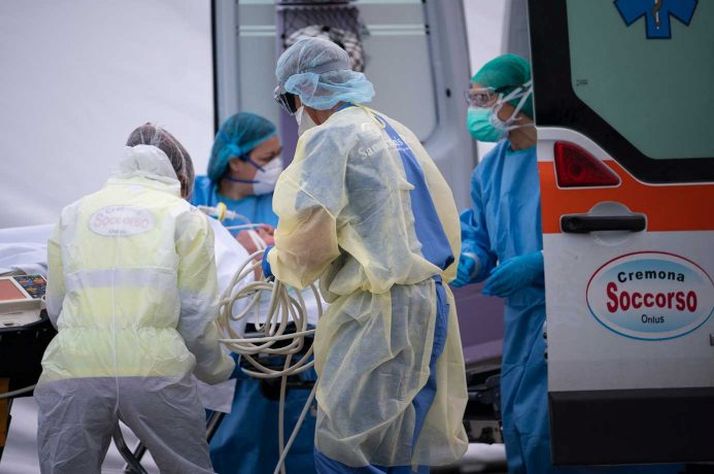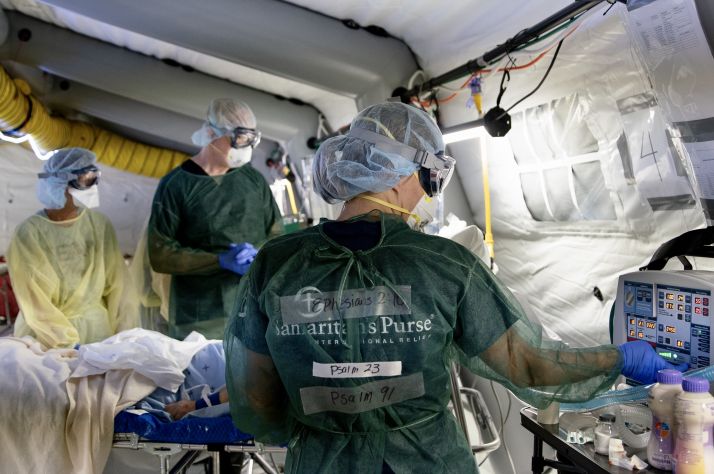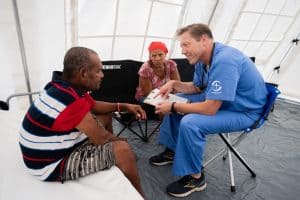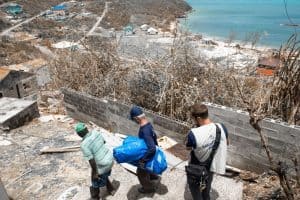The Samaritan’s Purse disaster response team is treating patients with coronavirus outside Milan.
Update: Go here for the latest article (as of March 23) on our Italy response: “Faith on the Front Lines of Coronavirus.” You may also want to see our COVID-19 landing page for additional, updated content.
Medical staff at the Samaritan’s Purse Emergency Field Hospital in Cremona, Italy, are now caring for multiple coronavirus patients in intensive care. The mobile medical facility was airlifted to Italy on March 17 and opened March 20 after being fine-tuned into a specialized respiratory care unit for those suffering with COVID-19.
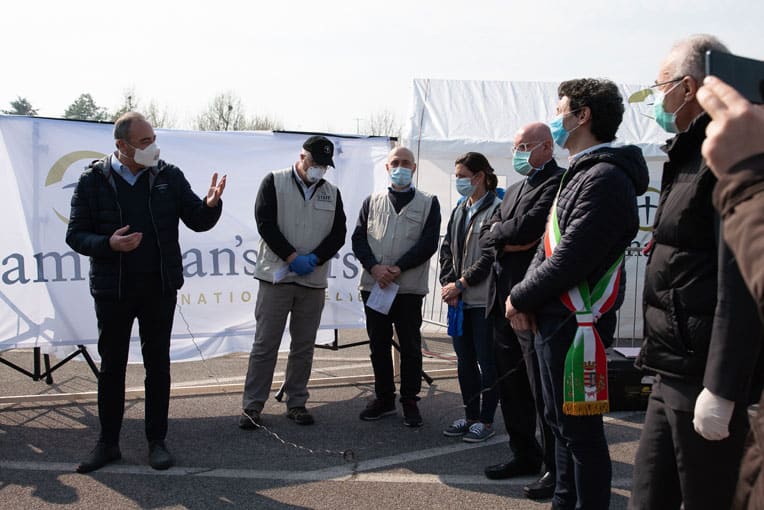
Local officials and Samaritan’s Purse staff join in a dedication ceremony.
Members of our disaster response team and local officials–including the mayor of Cremona, the director of Cremona Hospital, the regional minister of health, and Italian media outlets–gathered early in the morning on March 20 to dedicate the hospital to the community and to the Lord.
“Lombardy is leaving a dark period. You are a bright light. The first bright light in our dark sky,” said Giulio Gallera, the minister of health for the Lombardy region.
The field hospital was built in less than 36 hours through the efforts of about 30 Samaritan’s Purse disaster response staff, soldiers with the Italian Air Force, and volunteers for the Lombardy Region Civil Protection force. We opened on March 20 with eight ventilator-equipped ICU beds, 20 general care beds, a lab, and a pharmacy–all housed among eight tents that stretch across the Cremona Hospital parking lot.
“You are…the first bright light in our dark sky.”
A second airlift on March 21 by the Samaritan’s Purse DC-8 jet delivered another supply load to complete the 14-tent, 68-bed field hospital in Cremona, which lies just outside Milan in the hard-hit Lombardy region of Italy. A nearly 70-member team comprised of doctors; nurses; biomedical and lab technicians; electricians; and water, sanitation and hygiene specialists all will be on the ground this weekend.
“Everyone’s incredibly dedicated,” said Kelly Suter, medical director of the Italy COVID-19 response. “Everyone has been working around the clock, getting things done, filling in wherever they can. We’re all motivated by a desire to love like Jesus loves, to be His hands and feet and to be the miracle in darkness.”
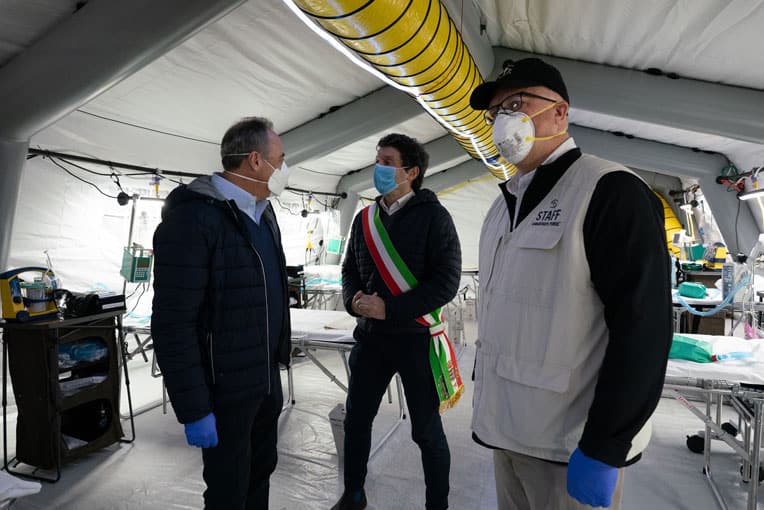
Giulio Gallera (left), Lombardy Minister of Health, and Gianluca Galimberti, Mayor of Cremona, tour our medical facility.
More than a quarter of Cremona’s 72,000-person population is over 65, and the city has been devastated by the coronavirus pandemic that is sweeping the globe. In recent weeks, Cremona Hospital has been so overwhelmed with an influx of COVID-19 patients from the surrounding region that it had to stop all other medical services, except for pediatrics and maternity. It, like many healthcare facilities around the world, currently faces a shortage of ventilators and even healthcare workers, as they themselves succumb to the infectious respiratory disease.
To date, none of the critical COVID-19 patients at Cremona Hospital have survived. Every day the hospital staff and community residents are feeling the physical and emotional strain. Our respiratory care unit will provide much needed support to the hospital, which will provide the initial screening, triage, and testing before sending patients into our care.
“They are supporting us significantly; this is very much a joint effort,” Suter said.
When we arrived, our team was told that with the entire country of Italy facing a daunting number of coronavirus cases, Cremona itself felt abandoned in the midst of it all. When local health authorities found out we were coming, they told Suter that they felt like their prayers had been answered. The Lombardy region has so far reported about 3,400 deaths related to the novel coronavirus, well more than half of Italy’s grim total.
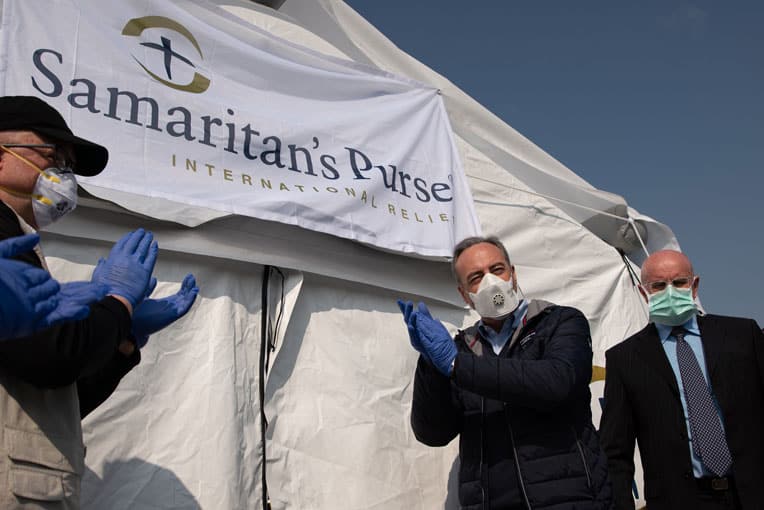
The Emergency Field Hospital begins today receiving patients.
For local Cremona resident Lara Raffini, a social worker, daily life in Cremona has changed drastically since the beginning of March when the first cases of COVID-19 began spreading among residents there. The streets of the city – birthplace of renowned luthier Antonio Stradivari–now echo with seemingly ever-present ambulance sirens and an occasional passing car, rather than the soaring strains of violin strings.
“In this silence, this is not life,” Raffini said. “This is very, very sad.”
In the face of all this, Raffini said that for many Italians–who thrive on social interaction and typically greet each other with a kiss on the cheek–“This I think is affecting the psychological part of ourselves because we started to understand that being together, being close, was a danger for our lives.”
That’s why the crucial support provided by the Samaritan’s Purse field hospital “is a hope point in this moment for our city,” Raffini said. “I think that if you want to overcome the sadness that you have inside, the first thing that you have to feel is that you are not alone.”
Hundreds are dying each day right now in northern Italy, and the country’s total death toll—now nearly 5,500—has far surpassed China’s as the highest in the world. So, from Suter’s perspective, the hospital opening could not have come at a better time.
“We’re all celebrating this opening together, and it can’t come at a better time,” Suter said. “Hopefully with our support, the support of many others and of course the grace of God, these numbers will start decreasing.”
Be strong and of good courage, do not fear nor be afraid of them; for the LORD your God, He is the One who goes with you. He will not leave you nor forsake you.—Deuteronomy 31:6
—
UPDATE March 21/22: A second Samaritan’s Purse airlift arrived in Milan, Italy, from Greensboro, North Carolina, on Sat. March 21. The additional staff and equipment/materials aboard the DC-8 complete the 60-plus-member disaster response team and fill out the full Emergency Field Hospital.
Since the start of the outbreak in Italy, nearly 60,000 COVID-19 cases have been noted.
The worldwide total of reported cases stands well above 300,000 with about 14,000 deaths.
This article was originally published on March 20 and new content (top video, etc) was added March 21. Numbers throughout article updated as of March 22 evening.


